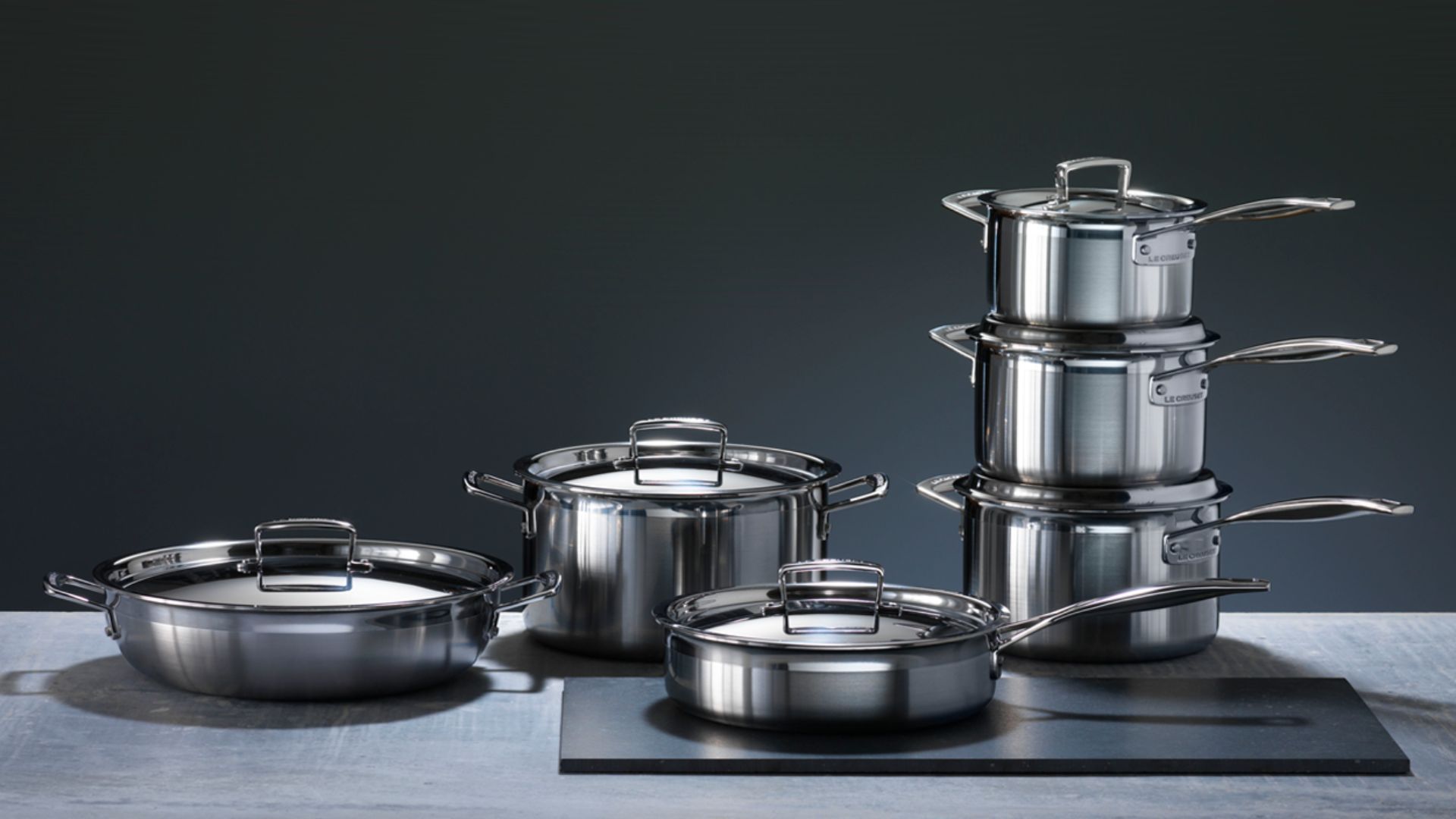
Le Creuset are famed for their cast iron pots, but what about Le Creuset Stainless Steel Pans? They're some of the best quality out there, so why are they in the shadows? And are they worth the splurge?
Le Creuset has been in the luxury cookware game for decades, making cast iron pots and pans that feature in any classic kitchen. Whilst you probably know the brand better for their Dutch Ovens and Casserole Dishes, I'm here to tell you that they make some of the best stainless steel pans on the market. And I think they deserve a little more credit.
If you look at stainless steel frying pans, you probably won't be surprised to find that Le Creuset's pans can be double the average RRP. I kept finding myself asking whether they were really worth the extra budget, so I put their 3-Ply Uncoated Frying Pan and Saucepan up against the best induction pans. Here's the tried and tested answer to the question "is Le Creuset worth it?"
Specifications
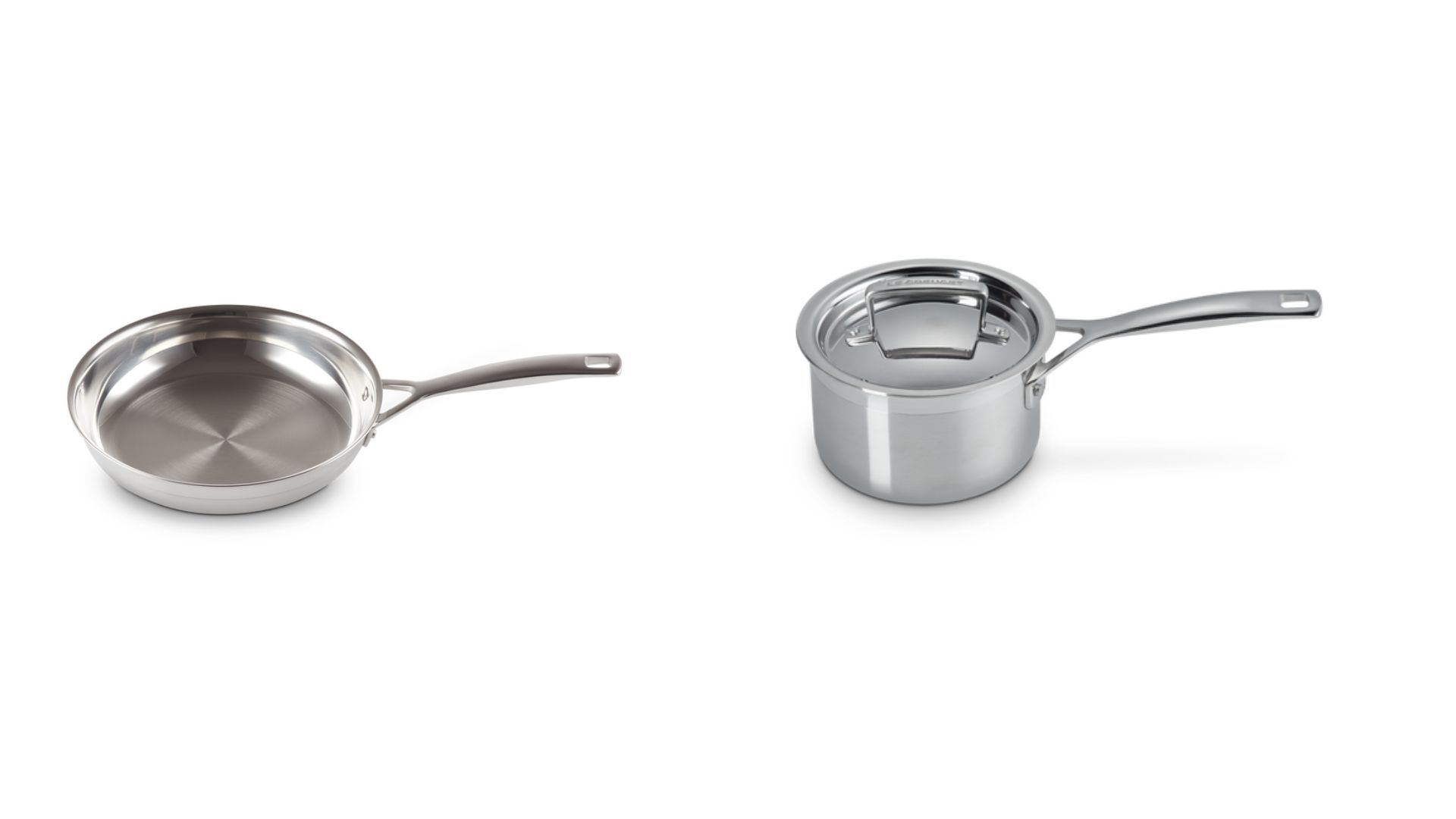
What's in the set?
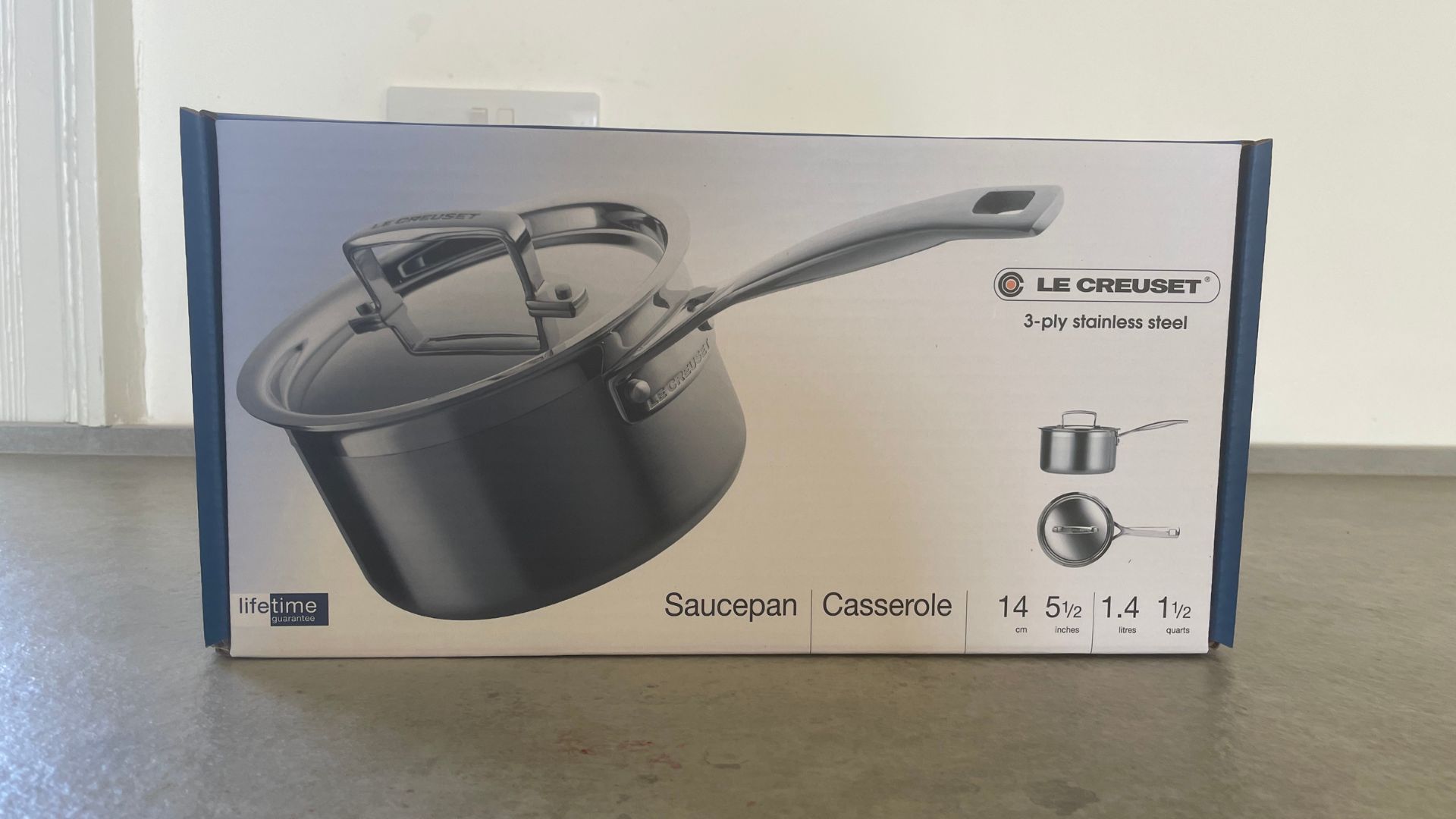
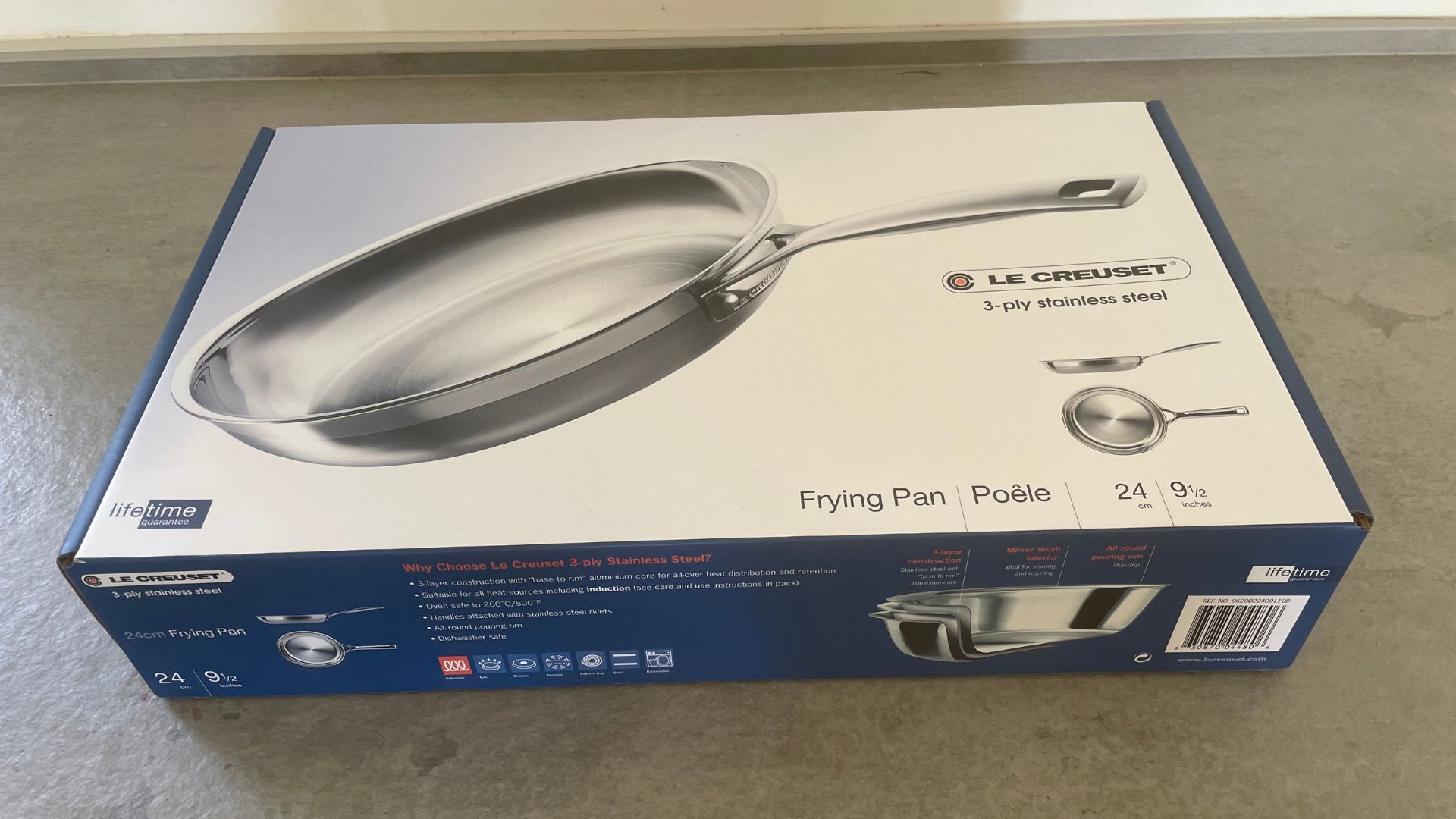
Whilst you can buy a full set of Le Creuset Stainless Steel Pans for around £300, it's likely that you'll end up with pans that you might not need. With that in mind, I put their 3-Ply Uncoated Frying Pan to the test alongside their smaller 3-Ply Uncoated Saucepan. The saucepan can speak for Le Creuset's range, just in different sizes, and the frying pan is sold separately anyway.
Who would they suit?
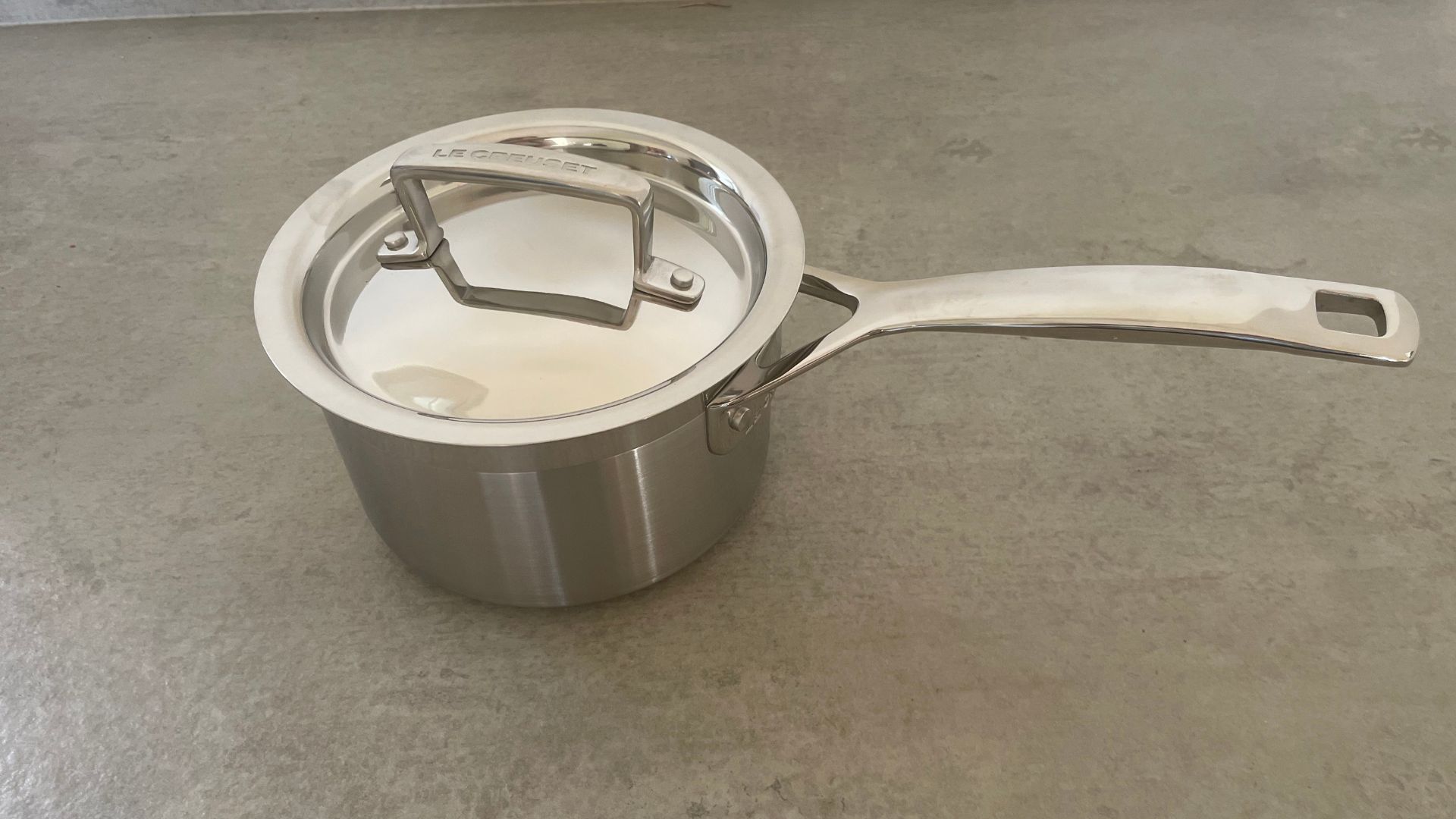
Le Creuset Stainless Steel Pans are the most premium that I've tested and you can tell. The design isn't very ostentatious, but those in the know will be able to tell that these are made of robust, luxurious materials.
Cooking with stainless steel is an art form. Plenty of stainless steel pans, especially frying pans, come with non-stick linings to stop you from burning food to your pan. However, these can pose health risks and they're also easier to damage and thus, easier to ruin for good. If you back yourself to get a stainless steel pan up to temperature properly, these will be an incredible investment. However, if you're not a confident cook, you might be better off with some non-stick options.
Whilst they feel the most durable, and their sheer solidity means that these pans are also some of the heaviest out there too. The handles are nice to hold, but I think the bigger saucepans might pose problems for those with wrist mobility issues.
Unboxing
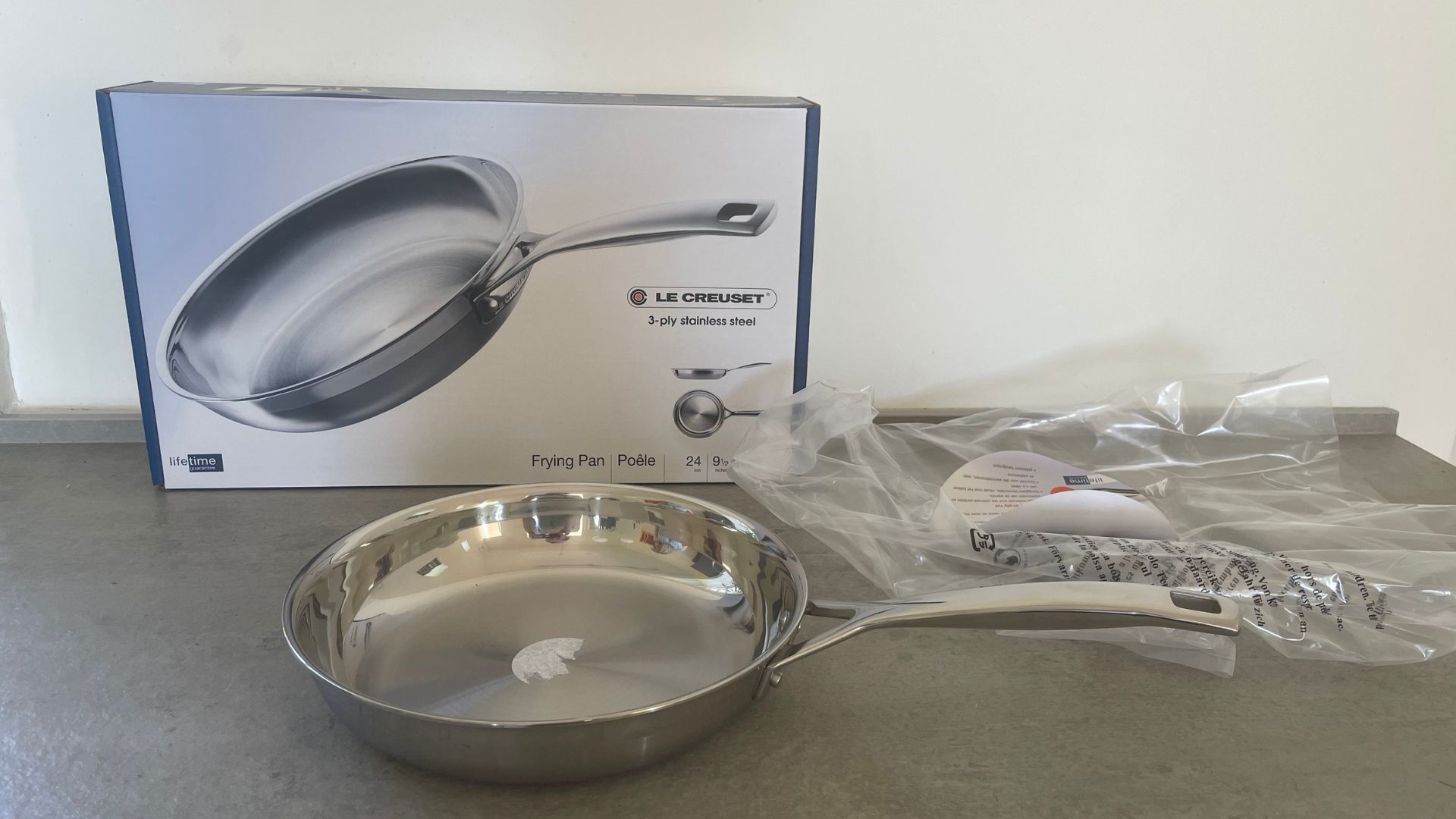
There's actually not much to say about what it's like to unbox the Le Creuset Stainless Steel Pans. They come in thick, cardboard boxes that protect the pans whilst they're in transit. Inside those pans is a soft plastic wrap that keeps the stainless steel from scratching. Whilst this part isn't super environmentally friendly, it does the job of keeping the pans shiny and new. Plus, there are recycling points in most big supermarkets for soft plastics now.
My one gripe with all of the unboxing is that Le Creuset puts a sticker in the middle of the frying pan. Plenty of other brands do this too, but the glue that they use makes it almost impossible to remove the sticker. I ran it under hot water and tried my utmost to wash it off without scratching these brand new pans. In the end, I cleared what I could, but there was still an adhesive film on the base of the pan. You'll see later that this caused problems with pancake making. Once I had burnt one pancake and cleaned that off, the glue seemed to go, but that's a lot of effort and waste for the sake of a sticker.
What are they like to use?
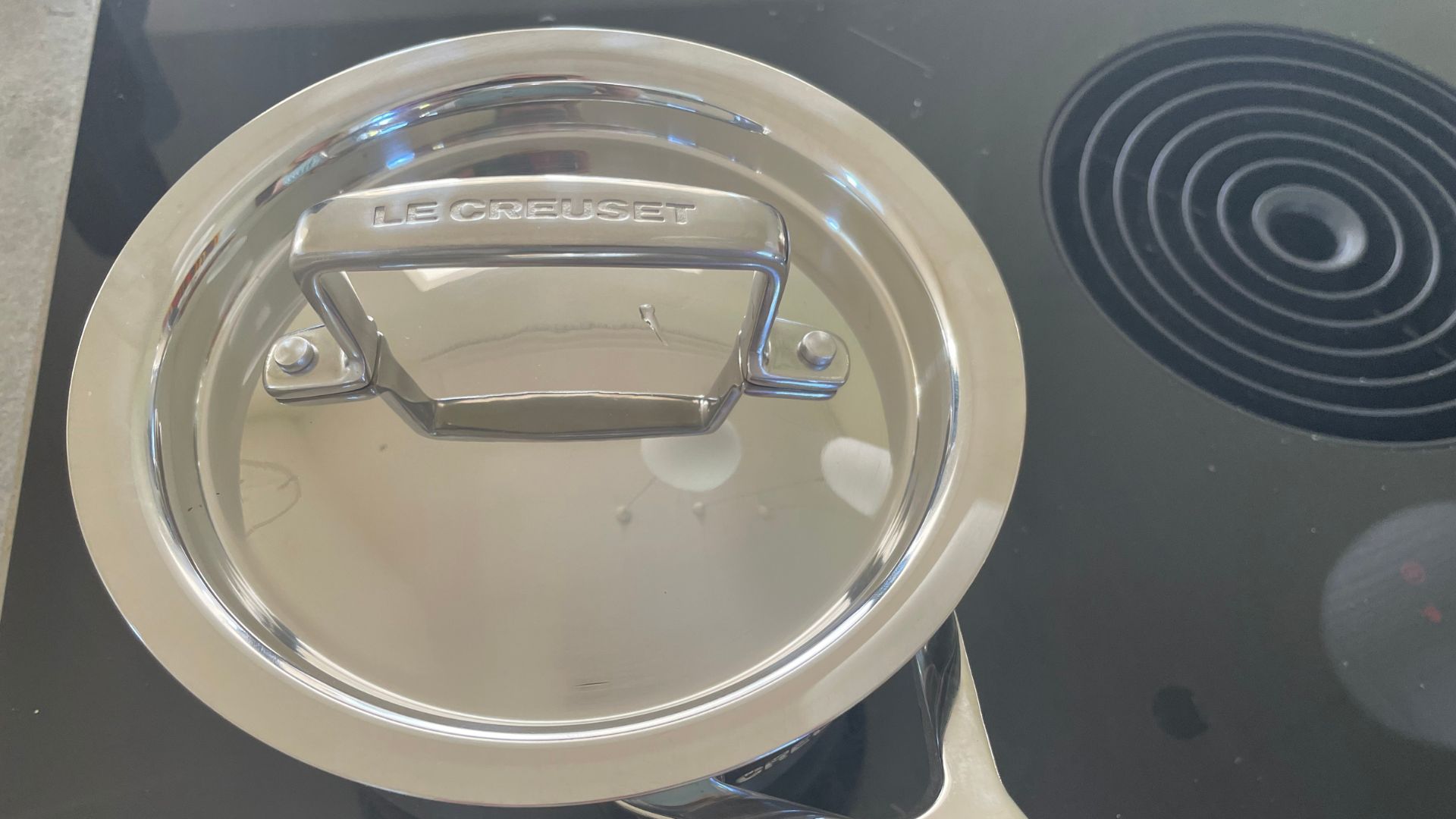
I've alluded to what it's like to use Le Creuset Stainless Steel Pans already. When you cook with stainless steel, the key is to get the base of the pan really hot. That way, the stainless steel becomes a bit like a non-stick, just without all of the plastics and chemicals.
The way that I tested the heat of these pans was by putting them on the hot, wetting my hand, and then using my hand to shake droplets of water onto the pan's surface (don't let your skin touch the pan). If the droplets dance on the base of the pan, it's hot enough. If they sit there, it needs more warming.
The Le Creuset Frying Pan and Saucepan warmed up slightly slower than some other models. There's not more than a minute's difference between these and the average pan, but it's notable. What this does mean is that the pans retained their heat a lot longer and more evenly than some of the other pans on test. It's one of those instances when you have to tell yourself that patience pays off.
Test 1: frying pan
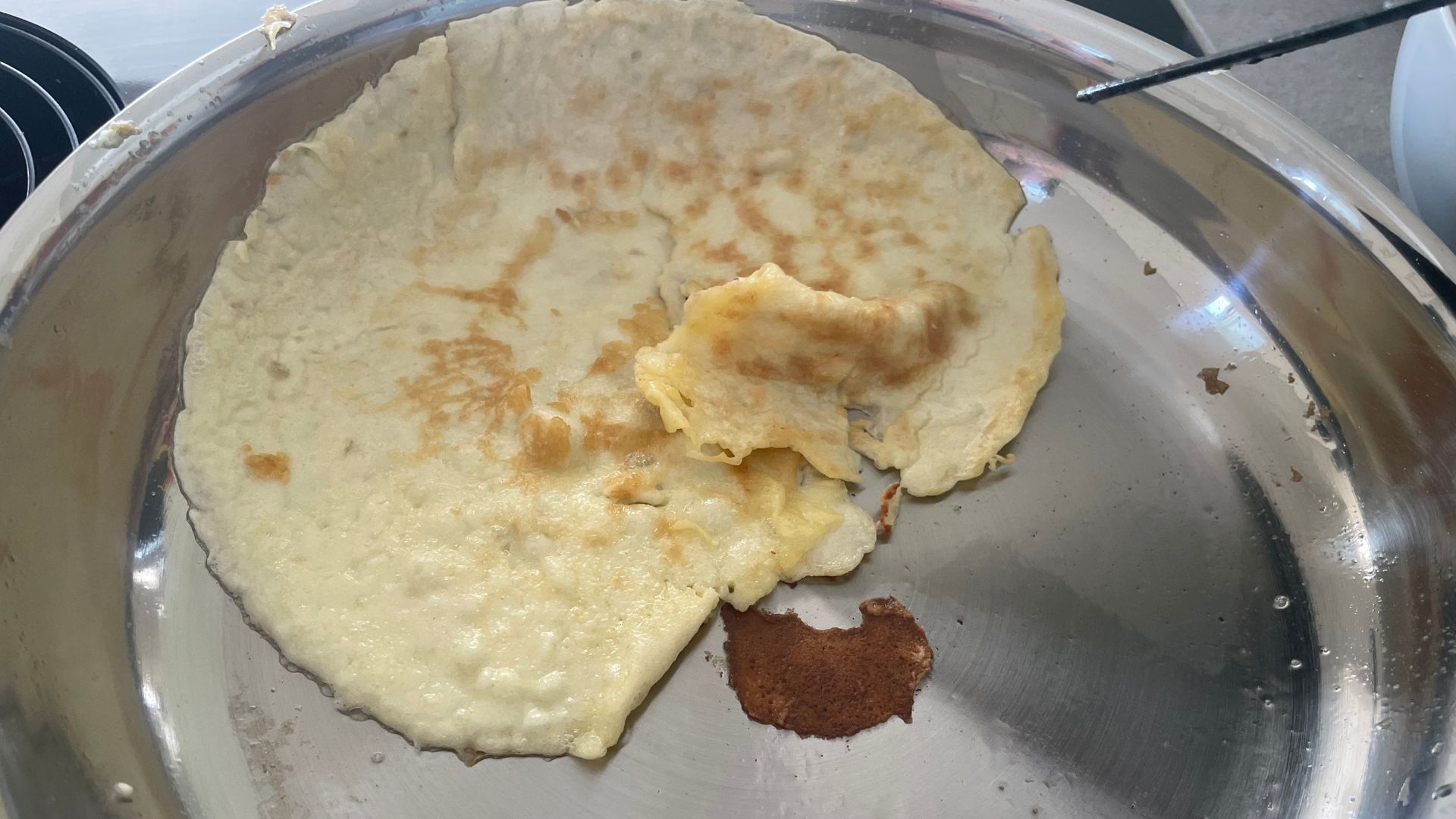
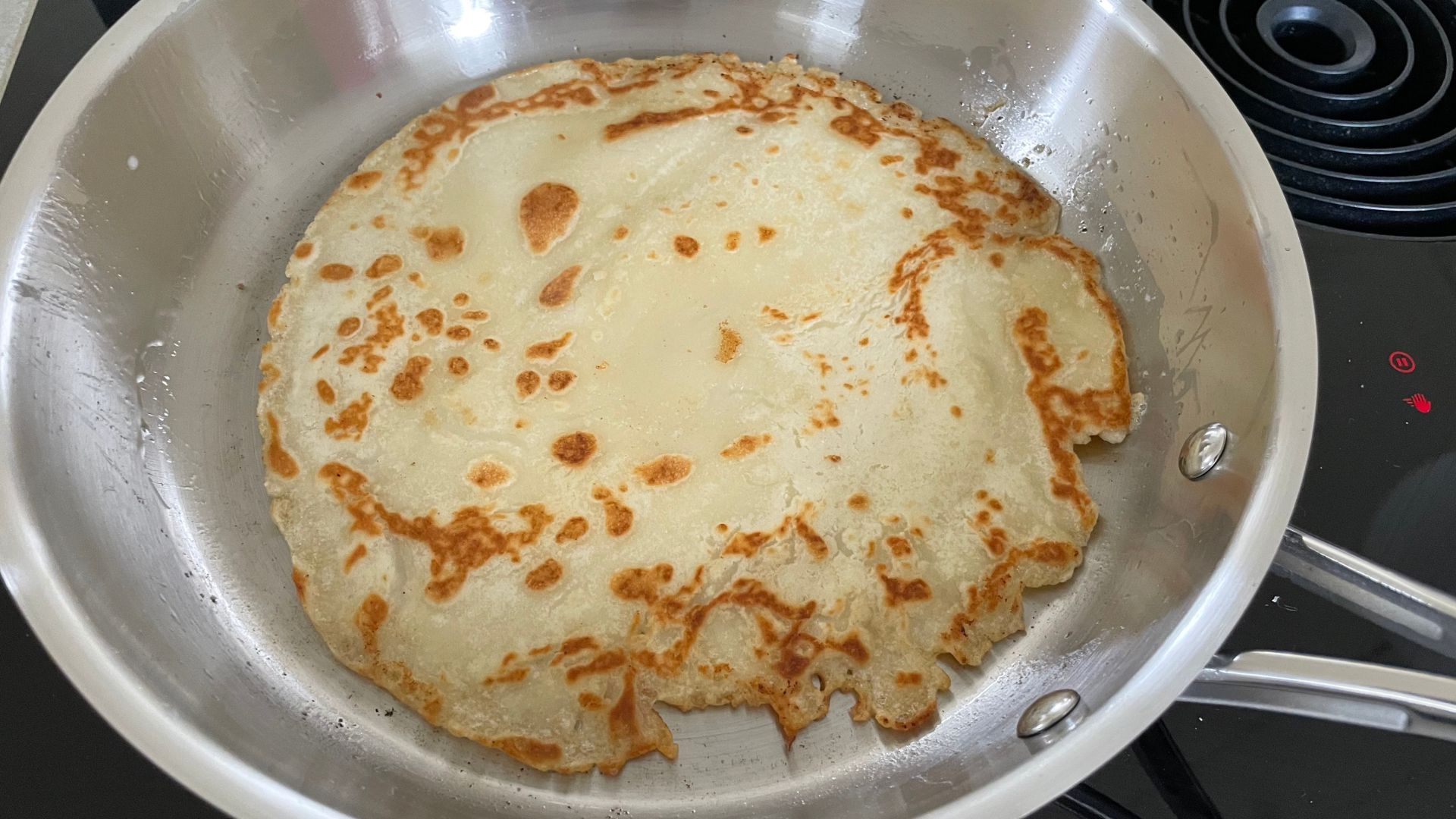
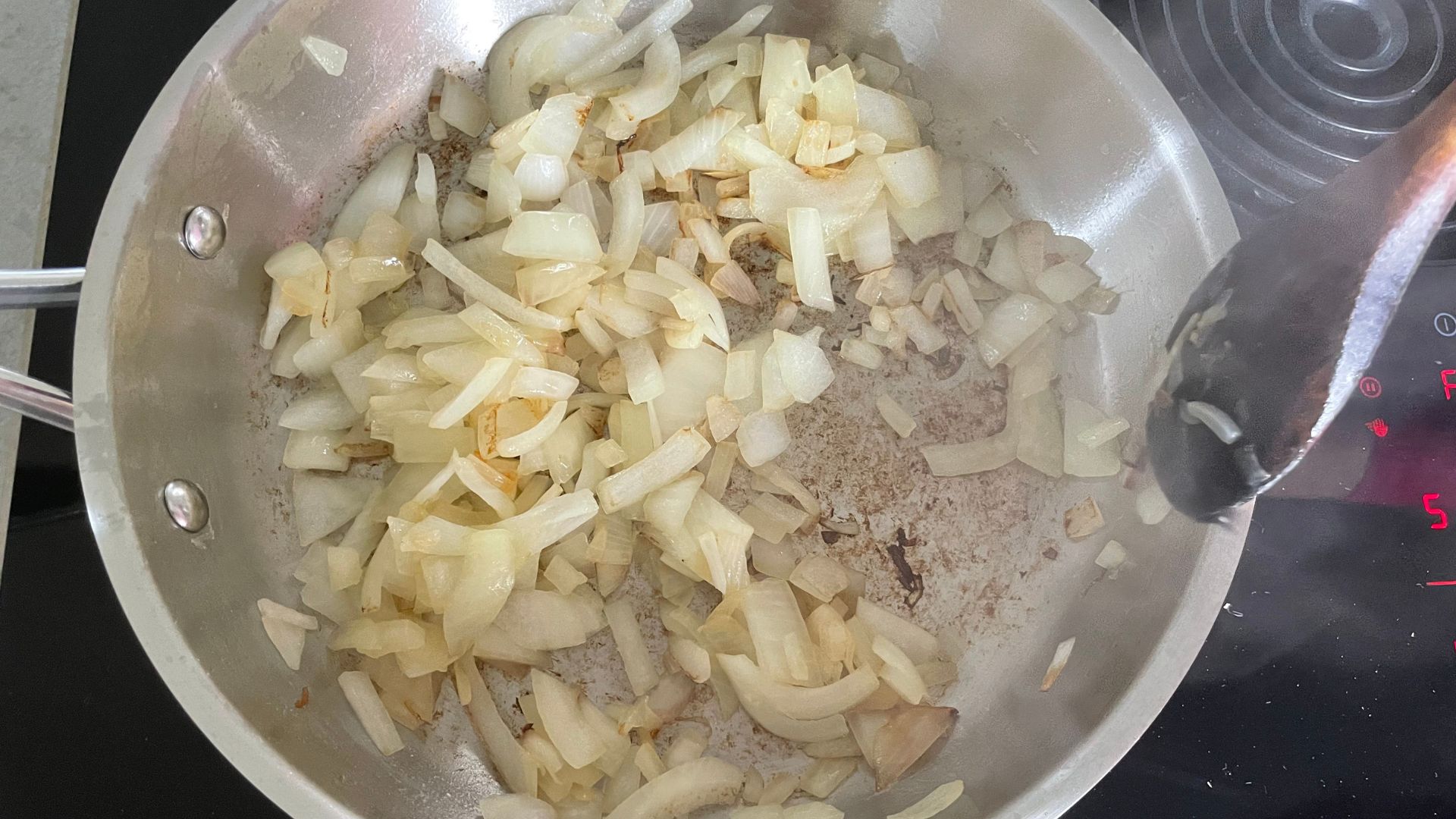
The Le Creuset 3-Ply Uncoated Stainless Steel Frying Pan is beautiful. I mentioned earlier that it's heavy, but the handle is nice to hold. It doesn't get too hot, it's slim, but not so slim that the weight feels unequally distributed. The sides of the frying pan are deep enough that you could use this for some slower cooking risottos and casseroles if you needed to, but they're still shallow enough for making pancakes and fried onions, which is exactly what I did.
The first test that I put all of our frying pans through is on pancakes because the brown speckles and crispiness give a great indicator of how evenly the heat has distributed across the base of the pan. Once the pan had heated up, it cooked the pancakes quickly. I could see the mix bubbling and flapping in the heat, so I picked the pan up to flip it.
The weight of the pan caught me by surprise. It definitely needs some adjusting, especially compared to the average frying pan. However, that's not what made the first flip challenging. The sticky glue circle in the middle had caught on my batter, stopping the pancake from lifting nicely out of the pan. The result was, as you can see in the image above, a pretty sad looking pancake with some burnt, glue-y batter in the middle. After rinsing it, I gave the frying pan another go.
On round two, three, four, and five, my pancakes were perfect. They slipped and flipped in the pan perfectly. The brown speckles were evenly distributed across the pancake on the top and bottom. It's a great piece of kit.

The next test that I put our frying pan through is cooking onions. These can be more sticky and temperamental than pancakes. It's easy for them to catch, cook to slowly, or burn before they've even softened. I chopped a whole white onion, added it to the pan with a drizzle of oil, and watched the onions. They went slightly translucent, a little soft, slightly brown at the edges, and then they quickly caramelized. In short, it went through the motions exactly as you would expect a professional frying pan to.
Test 2: saucepan
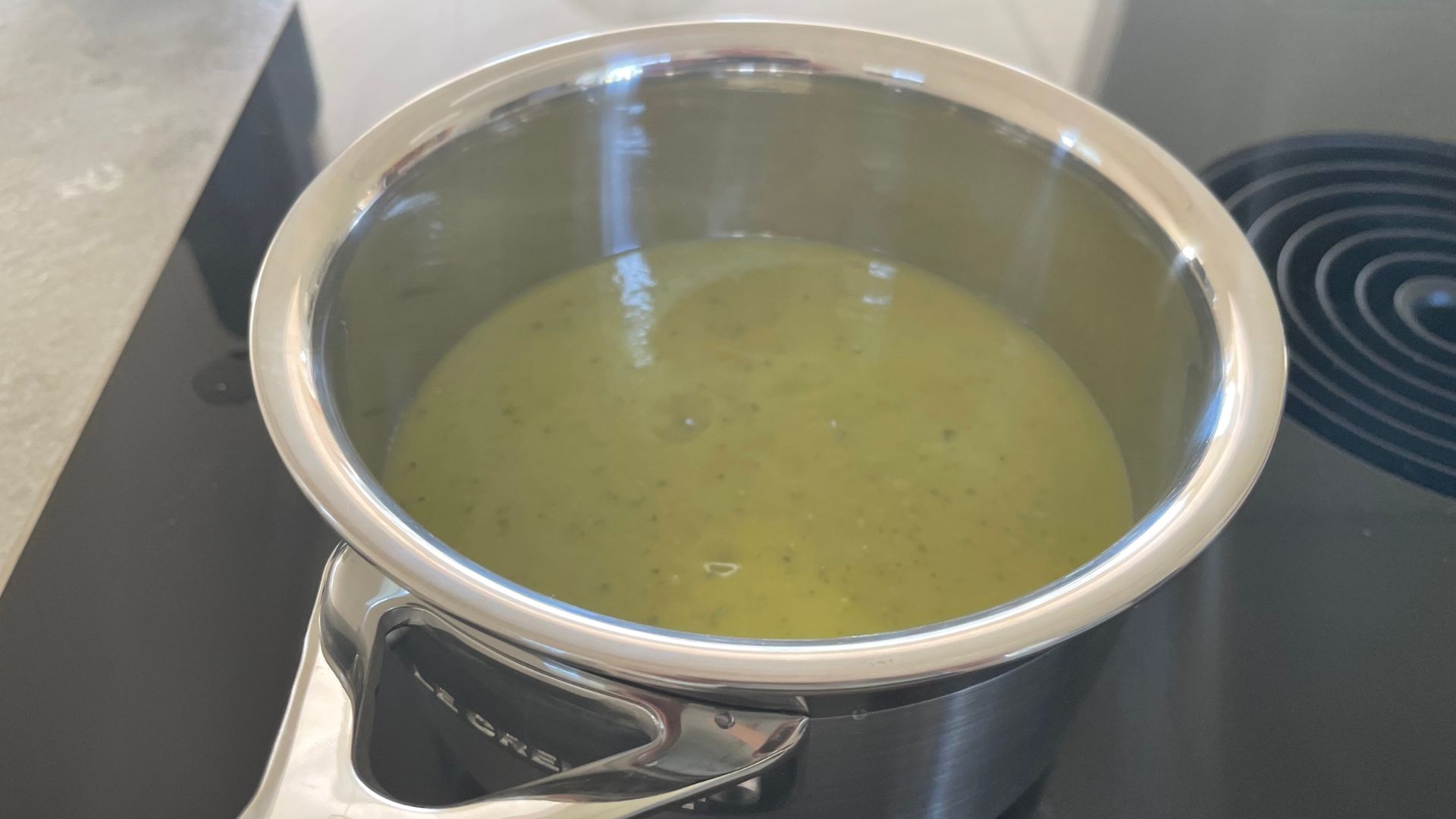
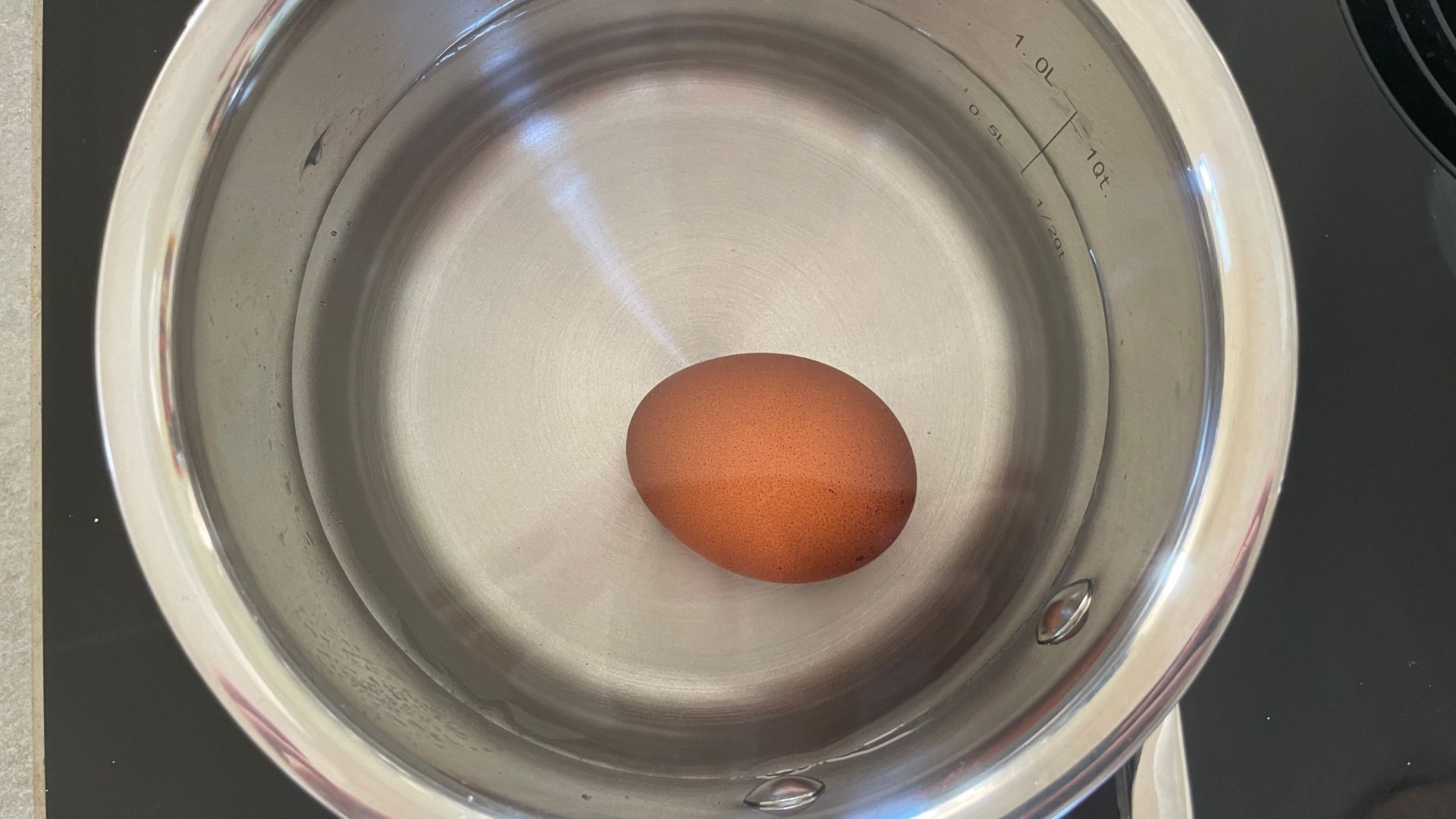
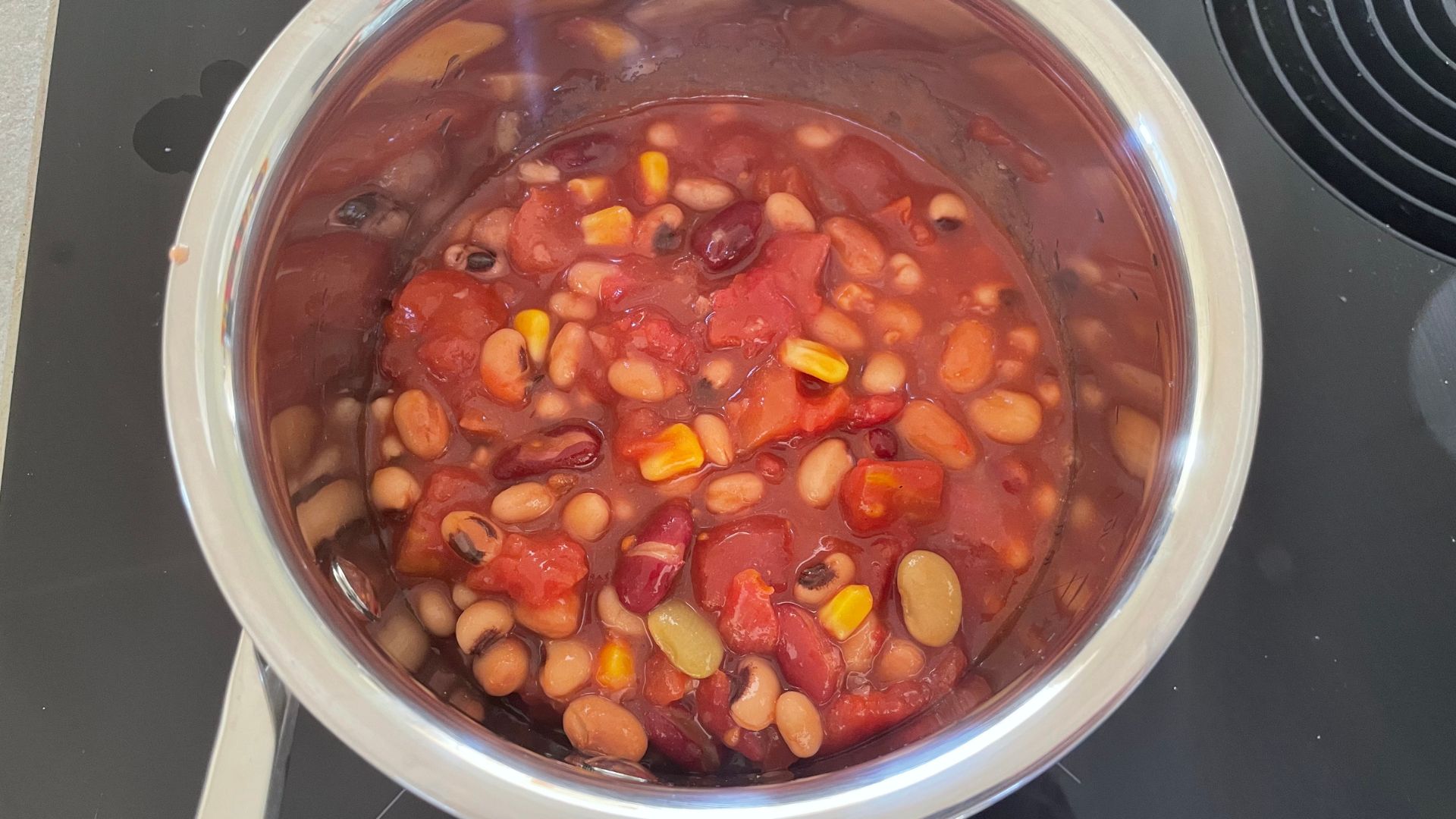
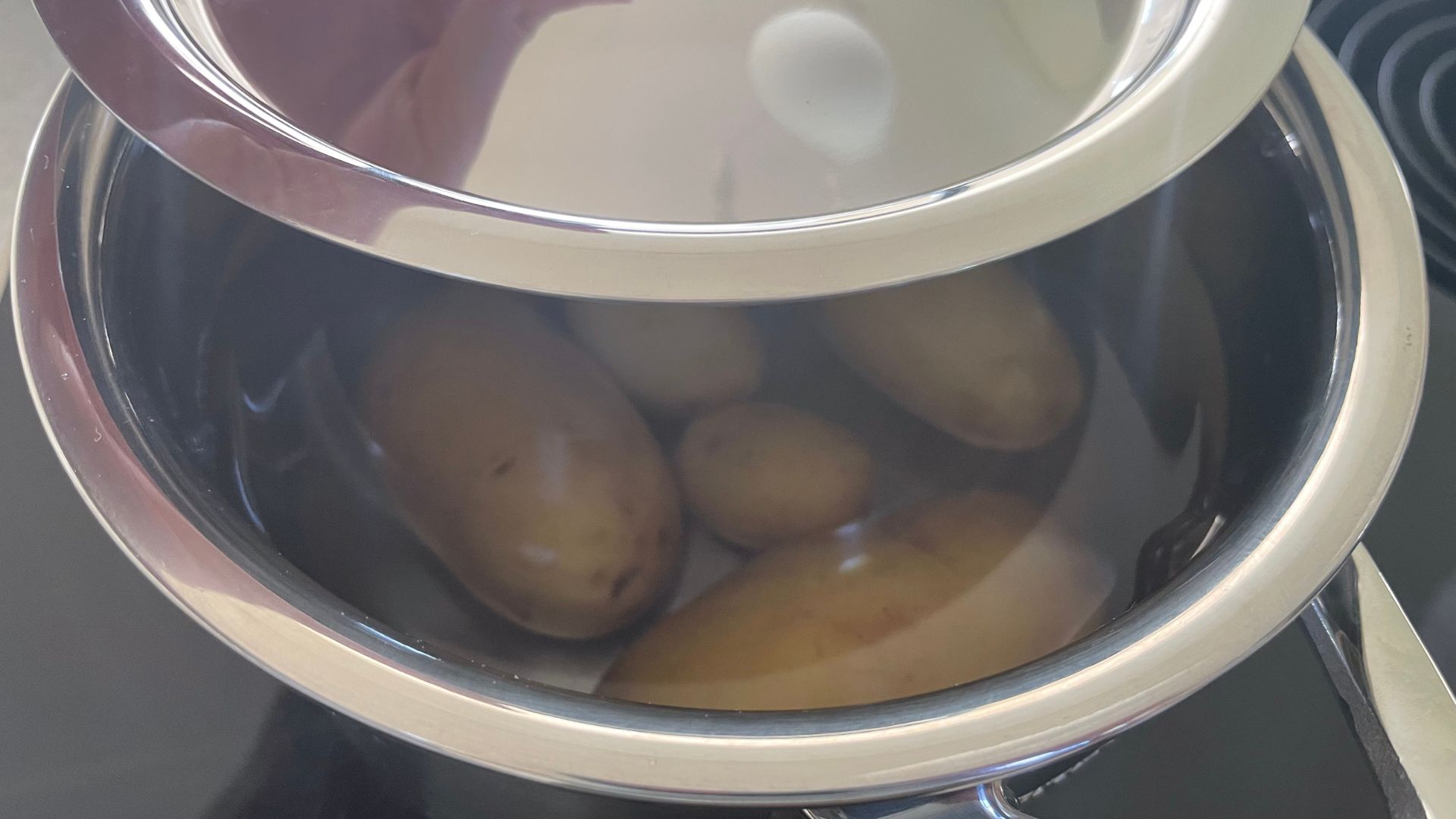
The other pan that I tested was Le Creuset's 3-Ply Stainless Steel saucepans. They say that this is suitable for casseroles, but I put it through a whole lot more than that.
On the inside of the pan are some water markers, which is handy if you don't want the hassle of measuring out your water in another vessel. I combined the tests that I put both saucepans and milk pans through, since this is about the size of a milk pan. I wanted to see whether this could be the pan that could cover every base for a single-person home. I won't keep you in suspense; it's a great pan.
The first tests that I put this through were the milk pan tests. That means that I used this to make porridge and to boil an egg. The porridge didn't stick or go stodgy, it cooked thoroughly and quickly. I could scoop it all into my bowl and enjoy a delicious bowl of morning oats.
The next day, my boiled egg was cooked in equally perfect time. I ran this test a few times to see how consistent the pan was. On every attempt, my egg was medium-soft boiled in five minutes. The eggs were exactly the same, every morning. That's the kind of realibale consistency I need in this crazy world.
When it came to the saucepan tests, I was adding more weight to the Le Creuset. I think this accentuated how long the handle was, because it did begin to feel a little heavy. I dread to think what the biggest saucepan is like when it's full of potatoes, especially without a handle on the other side.
I warmed up soup, boiled potatoes, made a bean stew, and also cooked a curry in this saucepan. All three were successful uses of the pan. It doesn't quite have the wide base that you might want if you're frying onions, but it does a good job of evenly heating whatever food you choose to throw in it.
The Le Creuset was certainly better on quicker tasks, such as warming soup and boiling potatoes. I felt it was a little eager with heating my bean stew and curry, but that's something that comes with size. A bigger Le Creuset Saucepan would handle those tasks much better.
Are they easy to clean?
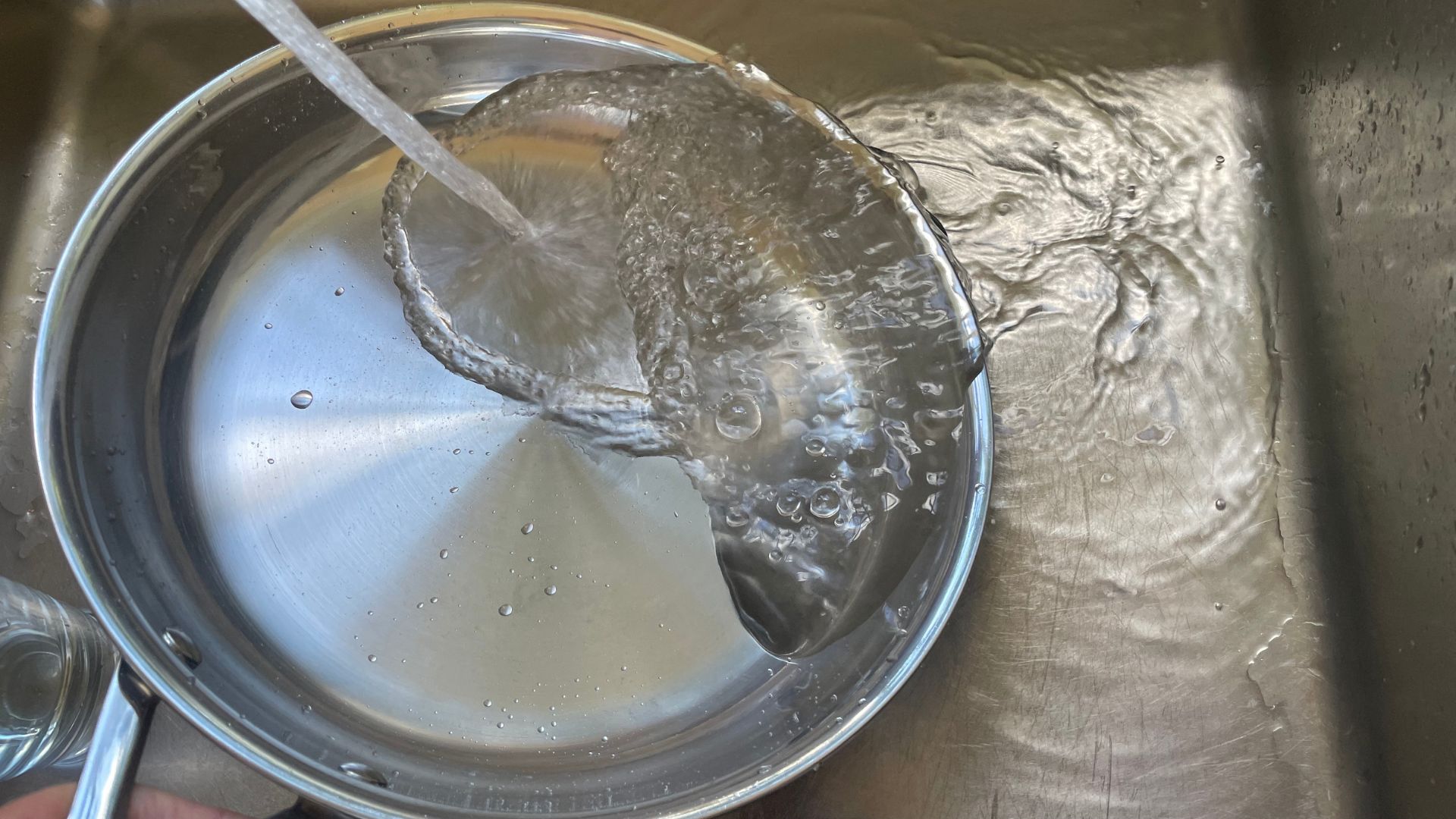
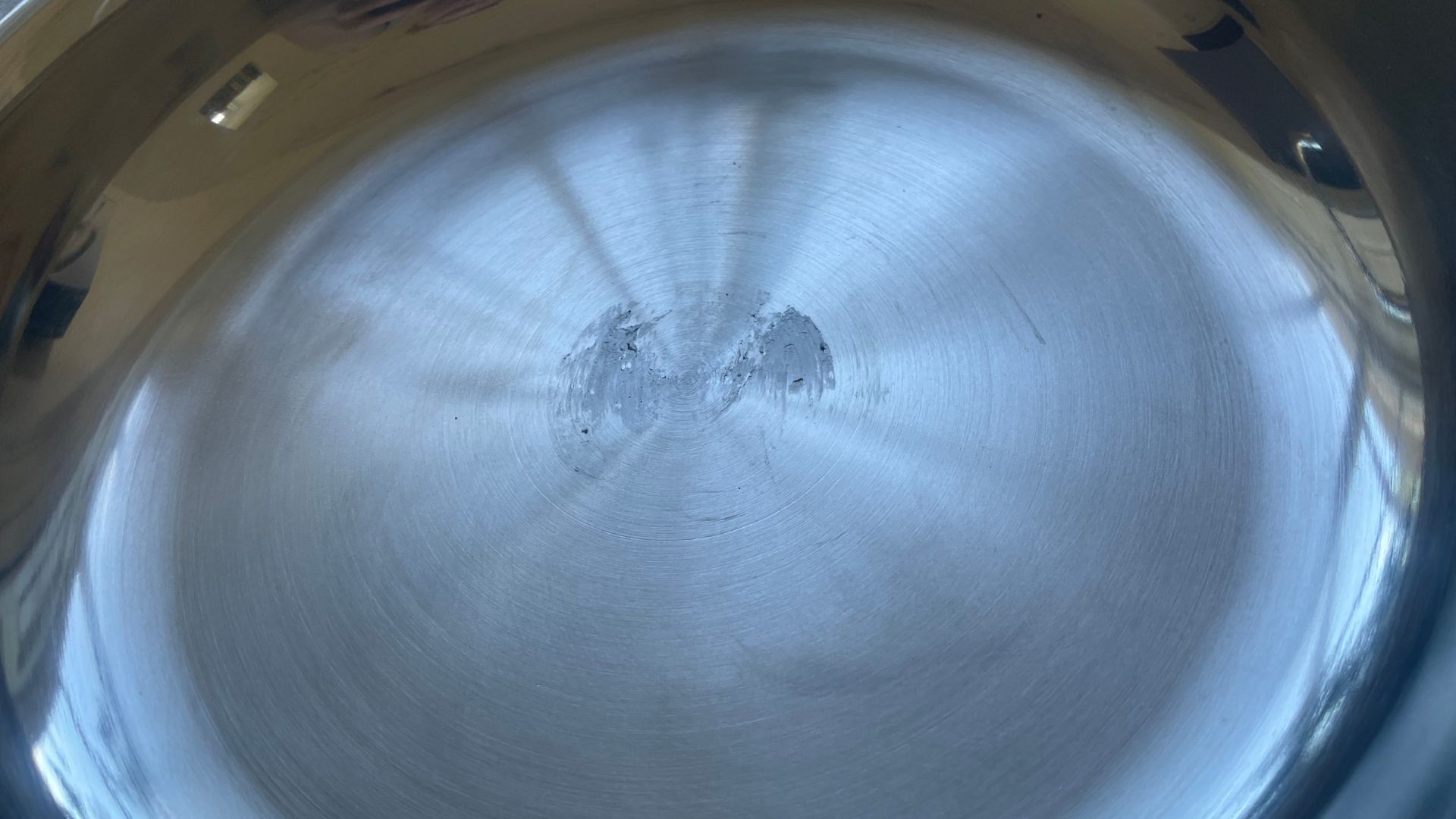
The Le Creuset Stainless Steel Pans are generally easy to clean. They don't really get food stuck to them and, when they did, most of it fell off with a little hot water and soap. The biggest issue that I had was with the glue from the sticker. I could have removed this with wire wool, but this isn't just any old stainless steel pan. It's a Le Creuset stainless steel pan. God forbid I scratch it with some wire wool. I would never forgive myself.
You can put these in the dishwasher, but, again, I stress that this is Le Creuset. If you've made the investment, you might as well wash them by hand. They'll last longer and stay in better condition. If you want to know how to clean stainless steel pans properly, we've covered all the details in an expert-informed article.
How do they compare?
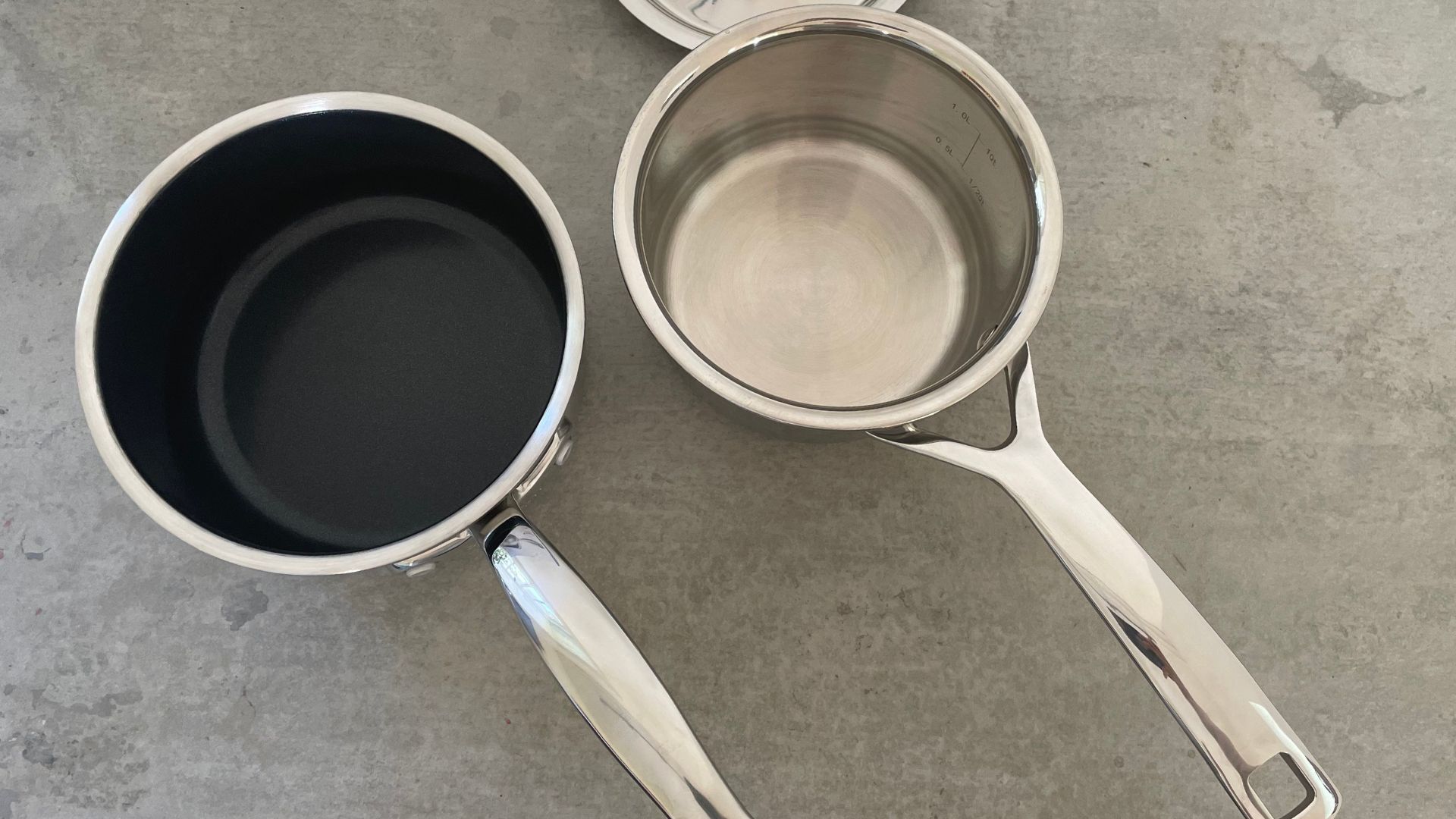
If you want a non-stick set of uncoated stainless steel pans, Le Creuset's make a great investment. They come with a lifetime guarantee and I could really imagine these becoming a family heirloom. Of all the pans I've tested, these are the ones I'd give as a wedding present or gift to new homeowners, if I was feeling generous. They're the most premium, durable, classic models out there.
As for non-stick pans, if you don't like the idea of cooking on chemicals, you have two options. You can take the skilled, Le Creuset approach and heat stainless steel up to high temperatures. Alternatively, you could invest in a model like GreenPan's. This is coated in ceramic, which is a safe alternative to plastic non-sticks. I've taken a side-by-side picture of the Le Creuset Saucepan next to its GreenPan sibling. The GreenPan was lighter, lower maintenance, and, arguably just as good. I think it's the student-friendly, budget-friendly alternative. It'll be easier to damage, but that's only because I would put the Le Creuset in the category of invincible.
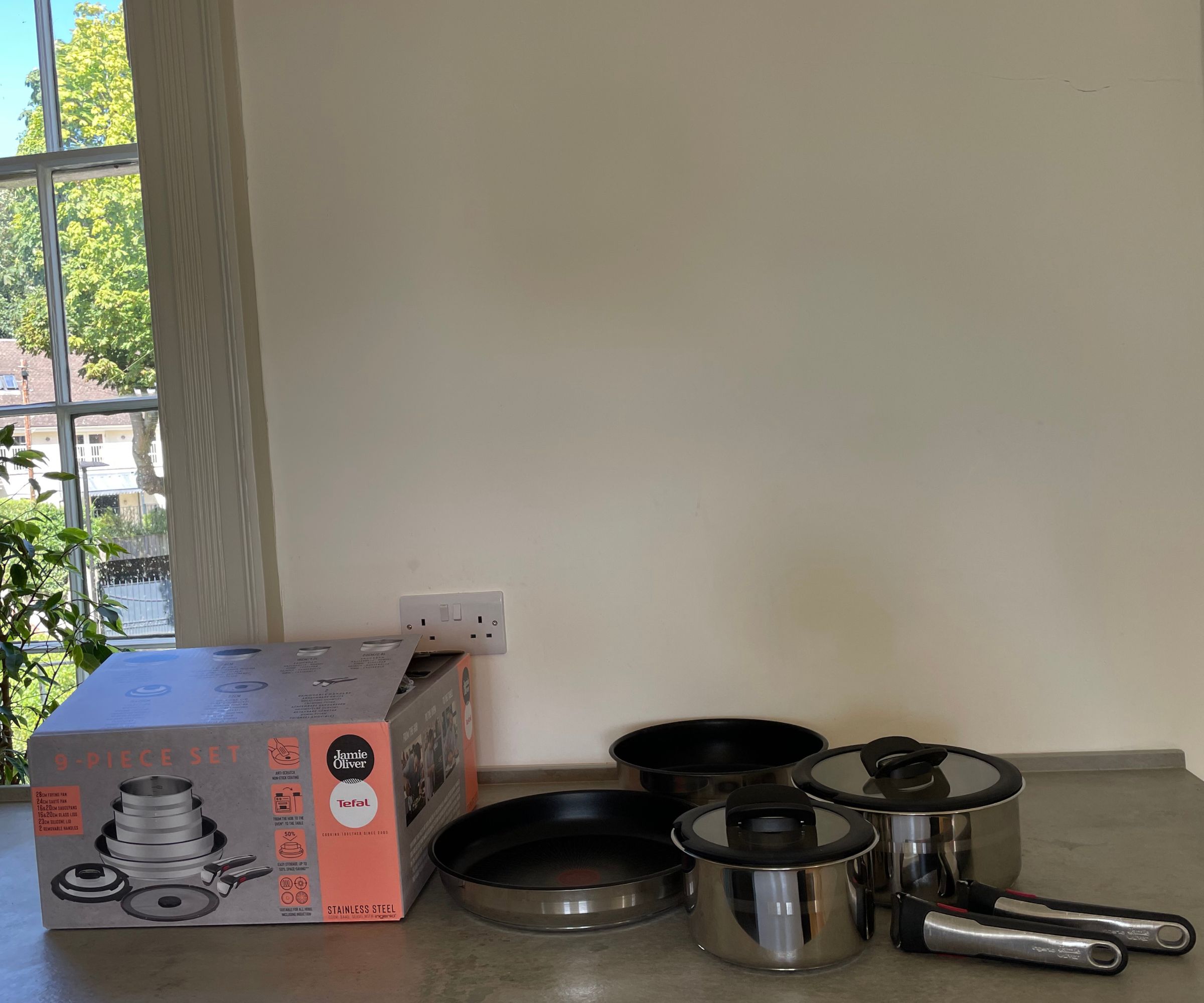
If you like the idea of kitting yourself out with some chef-worthy saucepans, I'd recommend taking a look at the Tefal Jamie Oliver Ingenio collection. I loved testing these pans and, whilst they're not cheap, they're much more affordable than the Le Creuset's. You'll have to buy the whole set, but the removable handles make them easy to stack and stow away. As long as you don't mind some titanium non-stick sitting inside your frying pan, these are a fantastic alternative.
Should you buy them?
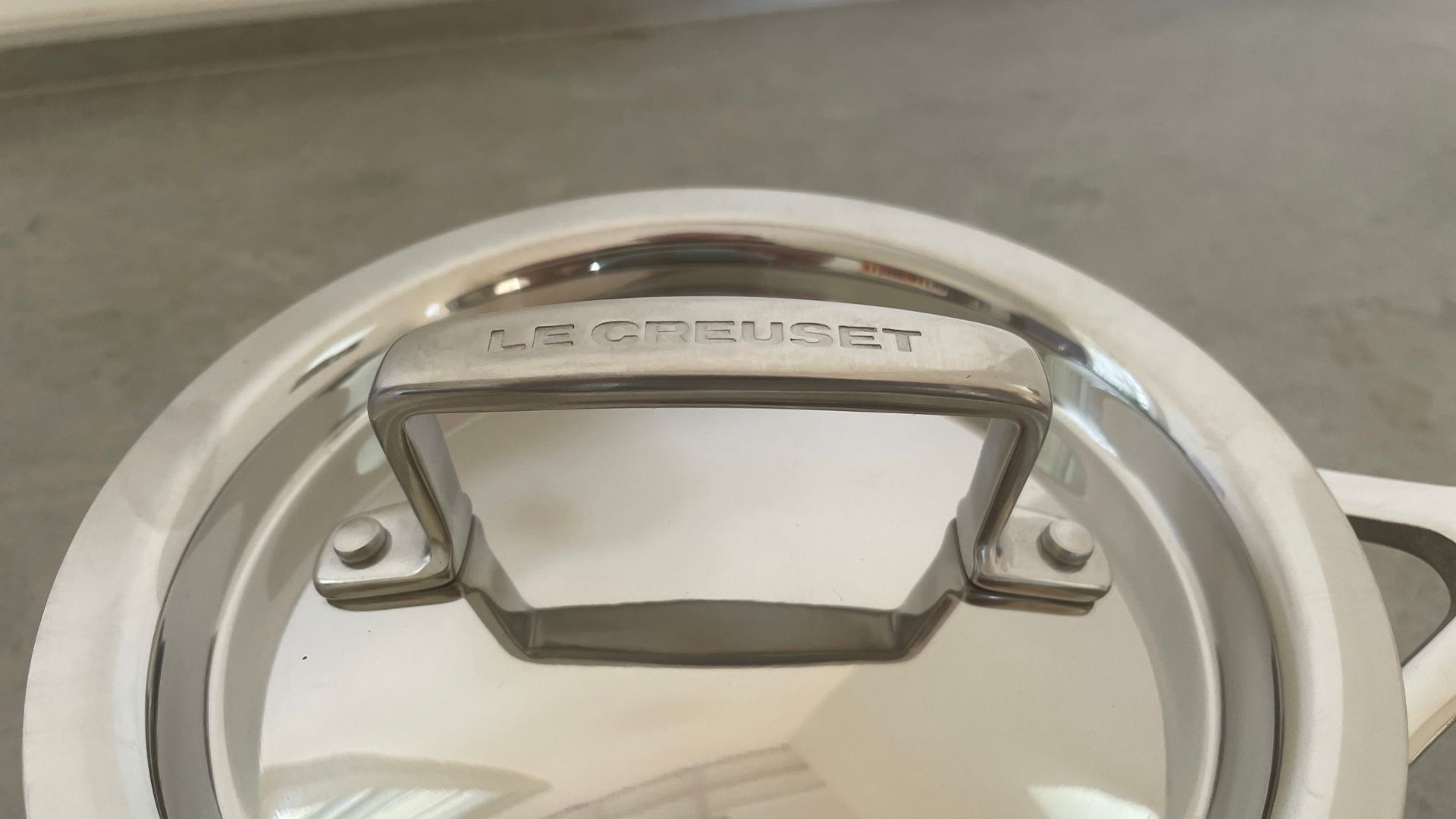
The Le Creuset Stainless Steel Pans are elegant. They look like classic, premium cookware and they feel like it too. Yes, they're a big upfront investment. However, they come with a lifetime guarantee, durable build, and timeless design. I think they're my favourite Le Creuset product out there.
How we test
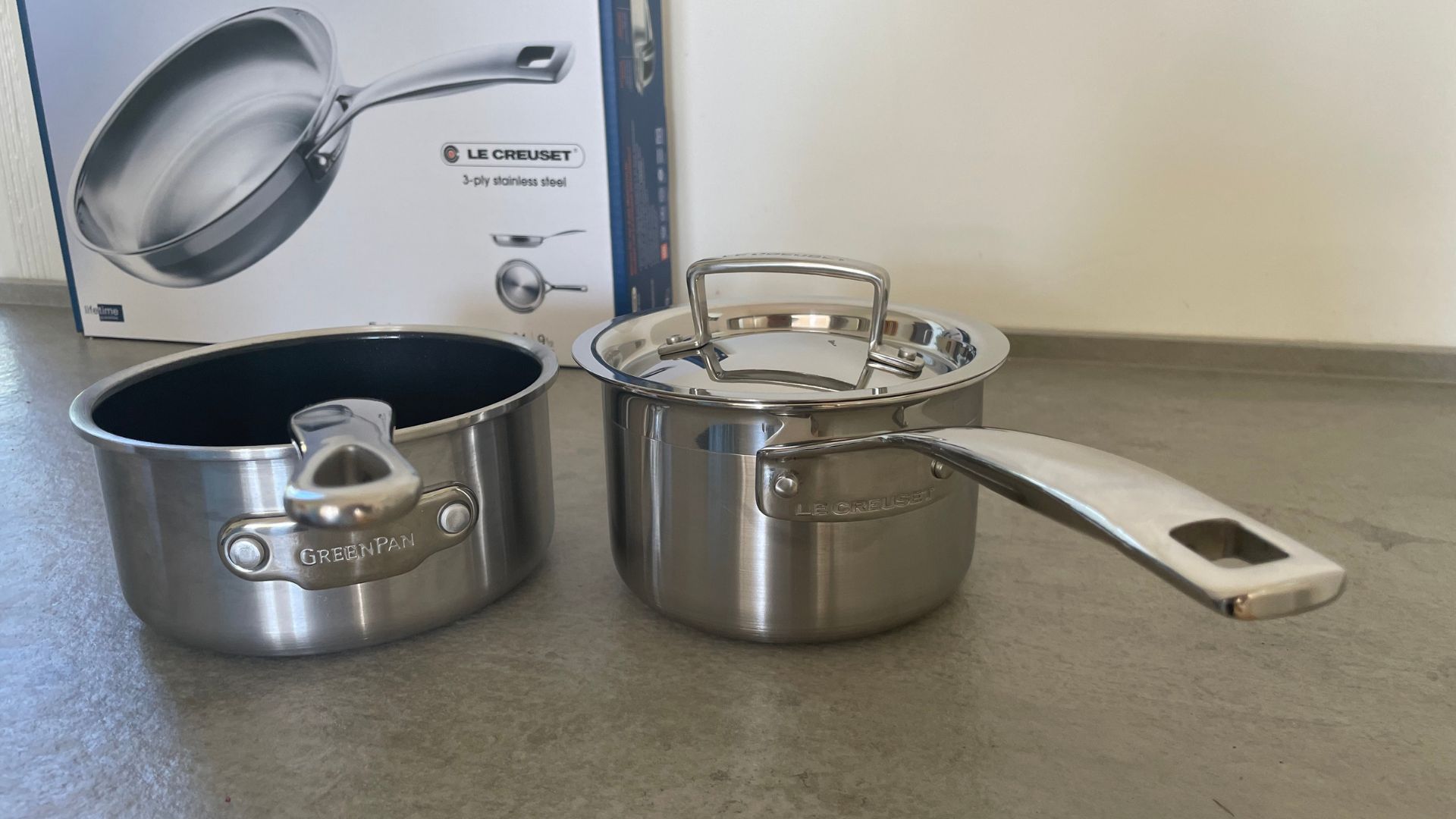
I've set up the process for how we test stainless steel pans at woman&home, so I'd like to think that it's a robust system. We don't just look at style, value, and build-quality, even though those certainly inform our reviews and recommendations. I make sure that we look at real-life scenarios that reflect how you would use these pans in your home.
I have a series of tests that I put every pan through to help me to determine whether it's any good. The first test that I put frying pans through is making pancakes. Each side of the pancake gives a map of the heat distribution through the lovely brown speckles that it gets on the cooked side. I look for even colouring, crispy edges, and a lovely, soft middle of my pancake.
Then, I'll use the frying pan to cook onions. Here, I'm looking for tender onions that are soft to bite into, but also a little bit sweet and caramelized. They should be golden brown and almost clear in the middle. It's no easy task, but the best stainless steel frying pans should be able to handle it.
When I test saucepans, I put them through a range of different tests. In the case of the Le Creuset 3-Ply Uncoated Stainless Steel Pan, I combined my milk pan and saucepan tests, because it looked like the kind of pan that I think I could use for both at home. This meant that I made porridge and boiled eggs (my milk pan tests), as well as soup, boiled potatoes, curry, and a casserole in the saucepan. I look at the temperature distribution, speed, and end texture of the food, all of which are great indicators for how well the saucepan can handle heat.
After all that, I clean the pans, making notes on how easy they are to wipe into shininess. Then, I compare them to similar sets on the market, checking that they're a competitive price, up to date on design, and worth the investment and space in your home. If they're not, I'll let you know some good alternatives.







